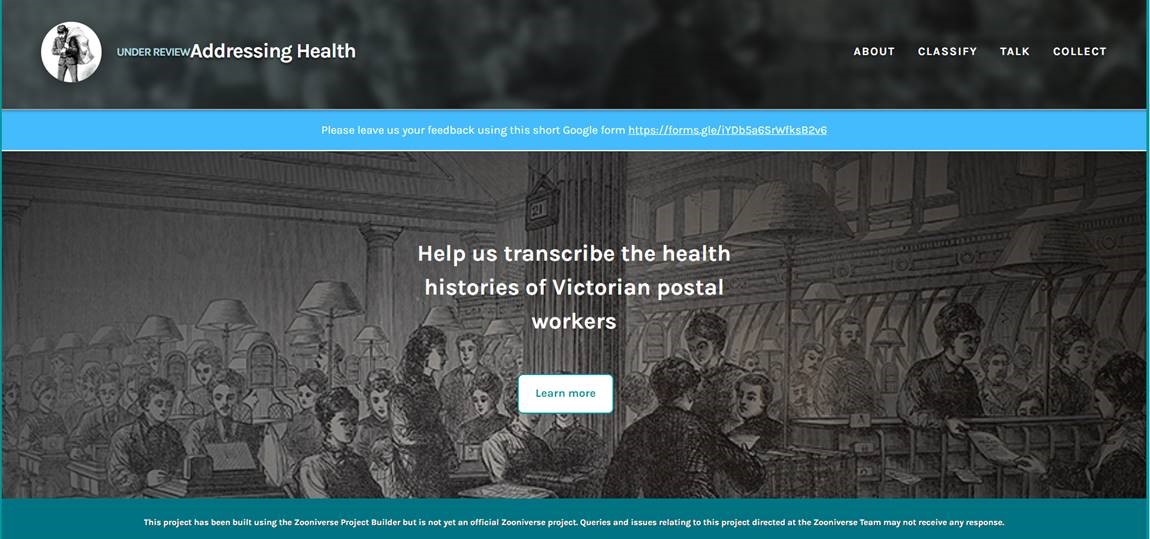At the end of May 1895 James Edward Buck applied for a Post Office pension. He was just 30 years old and had worked for the Post Office for nearly 15 years as a sorter in London. His pension application form reveals someone who took little time off for sickness. In the ten years before he retired he took an average of 16 days off a year because of illness, until 1895 when he took 110 days off. Given that he applied for his pension at the end of May that year, this meant that James Buck took over two thirds of 1895 off for reasons of illness. His pension application gives ‘Mental disturbances’ as the reason for his retirement and provides further details: ‘In February last he … absented himself from duty under circumstances which raised the impression that his mind must be affected and this impression has since been confirmed by the Medical Officer’. The form also noted that ‘As regards the immediate cause to which his mental infirmity is ascribed, it is only due to Buck to state that he has given no indication of “alcoholic excess” whilst on duty.’ His life after leaving the Post Office is uncertain; in 1901 he had recovered sufficiently to work as a bus conductor, but in the 1911 census he was recorded as not working and was sustaining himself on his Post Office pension of £20.0s.5d. a year.
The Postal Museum hold many more such pension records which contain similar details for about 30,000 Post Office workers in the nineteenth and early twentieth centuries. These records are invaluable both for the individual stories about working lives and for the statistics they can provide on the incidence of sickness in the period.
However, each pension application consists of at least three pages of information, so for the period our project covers there are more than 100,000 pages that contain the information we need. If we were to try and transcribe these records on our own, it would be impossible to do during the lifetime of the project. This is why Zooniverse is such a valuable and exciting platform; it allows members of the public to get involved with research by transcribing entirely new sets of data. It means that datasets larger than ever before can be used for research. More importantly, it allows academics to engage closely with the public, and both groups can benefit from each other’s expertise. As the team behind the Zooniverse platform puts it, ‘At the Zooniverse, anyone can be a researcher’.
Zooniverse arose out of an initial project called Galaxy Zoo, which was set up to allow members of the public to classify galaxies based on images provided online. The success of that project lead to other classification and transcription projects being hosted on the Zooniverse platform. Subjects have varied from mapping the Milky Way, to studying the animals of the Serengeti, to identifying historical fish, to transcribing anti-slavery correspondence.
While the projects that have used Zooniverse have varied greatly in subject, they have been united by their methodology, namely that public participation in academic research greatly increases the volume of data that can be processed and analysed. This, in turn, expands the kinds of research projects that are possible while simultaneously helping to bring academics and the public closer together. Chris Lintott, one of the co-founders of the Galaxy Zoo project, in his book The Crowd and the Cosmos (2019) summed up the power of this approach when he commented, ‘I remained in awe of quite how each small effort could add up to something grand.’
The potential of citizen science projects lies not just in the ability to crowd-source transcription. It also allows members of the public to become closely involved in the production of knowledge and to contribute directly to academic work in a way that is otherwise impossible. Again, Chris Lintott’s The Crowd and the Cosmos describes how volunteers who took part in an early Zooniverse project called Old Weatheralerted the project team to the value of logbooks as sources beyond their proposed use as sources for meteorological data, as they uncovered the stories of the sailors on board the ships whose logbooks the project used. This not only opened up new areas of investigation but also helped the project team better understand the data they were using and to spot inconsistencies and errors. In these ways, Zooniverse and other citizen science platforms allow academics and the public to co-operate on the production of knowledge.
This brief discussion of Zooniverse and its principles is all by way of an introduction to the recently launched Addressing Health Zooniverse project. This project consists of several workflows that allow you to transcribe different parts of the thousands of pension application forms held in The Postal Museum These workflows cover, variously, the location and occupation of the pensioners, the reason for their retirement, the date of their retirement and length of service, and details on periods of sickness in the ten years before retirement. The records contain thousands of stories like that of James Edward Buck. It is our hope that as you contribute to the transcription of these records you will discover all kinds of interesting and important stories about the postal workers whose lives constitute this archive and in doing so contribute not only transcriptions to our project but also narrative and analysis. Together we can create new knowledge and a better understanding of the history of health, medicine and work.
Dr Harry Smith
